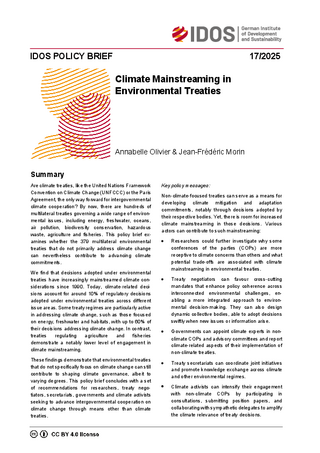Climate mainstreaming in environmental treaties
Olivier, Annabelle / Jean-Frédéric MorinPolicy Brief (17/2025)
Bonn: German Institute of Development and Sustainability (IDOS)
DOI: https://doi.org/10.23661/ipb17.2025
Are climate treaties, like the United Nations Framework Convention on Climate Change (UNFCCC) or the Paris Agreement, the only way forward for intergovernmental climate cooperation? By now, there are hundreds of multilateral treaties governing a wide range of environmental issues, including energy, freshwater, oceans, air pollution, biodiversity conservation, hazardous waste, agriculture and fisheries. This policy brief examines whether the 379 multilateral environmental treaties that do not primarily address climate change can nevertheless contribute to advancing climate commitments.
We find that decisions adopted under environmental treaties have increasingly mainstreamed climate considerations since 1990. Today, climate-related decisions account for around 10% of regulatory decisions adopted under environmental treaties across different issue areas. Some treaty regimes are particularly active in addressing climate change, such as those focused on energy, freshwater and habitats, with up to 60% of their decisions addressing climate change. In contrast, treaties regulating agriculture and fisheries demonstrate a notably lower level of engagement in climate mainstreaming.
These findings demonstrate that environmental treaties that do not specifically focus on climate change can still contribute to shaping climate governance, albeit to varying degrees. This policy brief concludes with a set of recommendations for researchers, treaty negotiators, secretariats, governments and climate activists seeking to advance intergovernmental cooperation on climate change through means other than climate treaties.
Key policy messages:
Non-climate-focused treaties can serve as a means for developing climate mitigation and adaptation commitments, notably through decisions adopted by their respective bodies. Yet, there is room for increased climate mainstreaming in those decisions. Various actors can contribute to such mainstreaming:
• Researchers could further investigate why some conferences of the parties (COPs) are more receptive to climate concerns than others and what potential trade-offs are associated with climate mainstreaming in environmental treaties.
• Treaty negotiators can favour cross-cutting mandates that enhance policy coherence across interconnected environmental challenges, enabling a more integrated approach to environmental decision-making. They can also design dynamic collective bodies, able to adopt decisions swiftly when new issues or information arise.
• Governments can appoint climate experts in non-climate COPs and advisory committees and report climate-related aspects of their implementation of non-climate treaties.
• Treaty secretariats can coordinate joint initiatives and promote knowledge exchange across climate and other environmental regimes.
• Climate activists can intensify their engagement with non-climate COPs by participating in consultations, submitting position papers, and collaborating with sympathetic delegates to amplify the climate relevance of treaty decisions.
Annabelle Olivier is a PhD student in Political Science at the University of British Columbia.
Jean-Frédéric Morin is Full Professor at the Political Science Department of Université Laval, Canada

